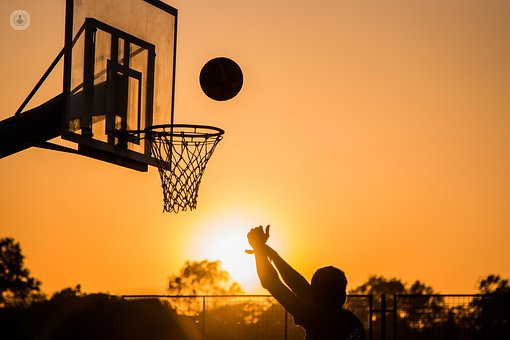The most common hand and wrist injuries in sport
Written by:Most sports, particularly those involving balls and rackets involve some kind of contact with the hands and fingers. Some sports such as basketball or netball are prone to more hand injuries. It’s quite easy to injure, fracture or dislocate the fingers or knuckles with these sports. If pain and swelling don’t go away after a few days of rest, ice and anti-inflammatories, you should have your fingers or hand checked with an x-ray. Injured joints can stiffen very quickly, and once stiff, are difficult to get back to normal. In this informative article, highly respected consultant orthopaedic surgeon Miss Tanaya Sarkhel tells us more about common hand and wrist injuries.

Is it easy to damage the wrist?
An outstretched hand is something we do subconsciously when we fall to prevent injuring ourselves. There may not be immediate trouble with the wrist, but swelling and stiffness might develop overnight. Fractures are felt straight away as there will be immediate bruising, swelling and a physical change in shape.
Ligament injuries, on the other hand, are more difficult to detect. If you feel your wrist is sprained, have it checked out. There are a number of important structures inside the wrist, holding the little bones together and if they become injured or torn, it can impact how the wrist works later in life. An x-ray can help detect what trauma has happened to the wrist and help towards deciding on the correct rehabilitation after diagnosis.
Which sports are the riskiest for hand and wrist injuries?
Any sport or activity that takes place at speed can result in an injury if the player or participant comes to a sudden halt. For example, coming off a snowboard or a push bike and making contact with the road can injure the ligaments in the hand and wrist and cause breakage. Most people enjoy these activities without risk of injury, but if an injury happens, it’s best to have it checked out.
I receive many scaphoid fractures and wrist fractures during the winter with winter sports such as snowboarding, ligament injuries or dislocations are associated more with the summer months when the ground is softer, hence injuries at this time of the year are less severe.
What can be done about hand and wrist injuries?
Most of us have very busy lives and pain anywhere can be quite an inconvenience. What we should do is take measures straight away, after an injury. Some people take anti-inflammatories or use rest and ice to help the hand or wrist to recover. However, sometimes, even after these measures are taken, discomfort doesn’t always settle down. If you have pain that’s keeping you up at night and it has lasted for more than a week, it should be investigated to see if it’s a sprain, cartilage injury or torn ligament. A simple x-ray or scan can put your mind at rest. The most important part of getting better from an injury is identifying what that injury is.
There are different rehabilitation plans for different injuries. For joint dislocations or ligament injuries, it’s vital to start with early active movement, but if there is a fracture or a broken bone, this would not be advised. It helps to identify what the injury is right from the beginning and then together with your doctor, you can plan the correct course of rehabilitation. A fracture to a bigger bone such as the wrist may require surgery.
If you have injured your hand or wrist and would like to schedule a consultation with Miss Tanaya Sarkhel, you can do so by visiting her Top Doctors profile.


